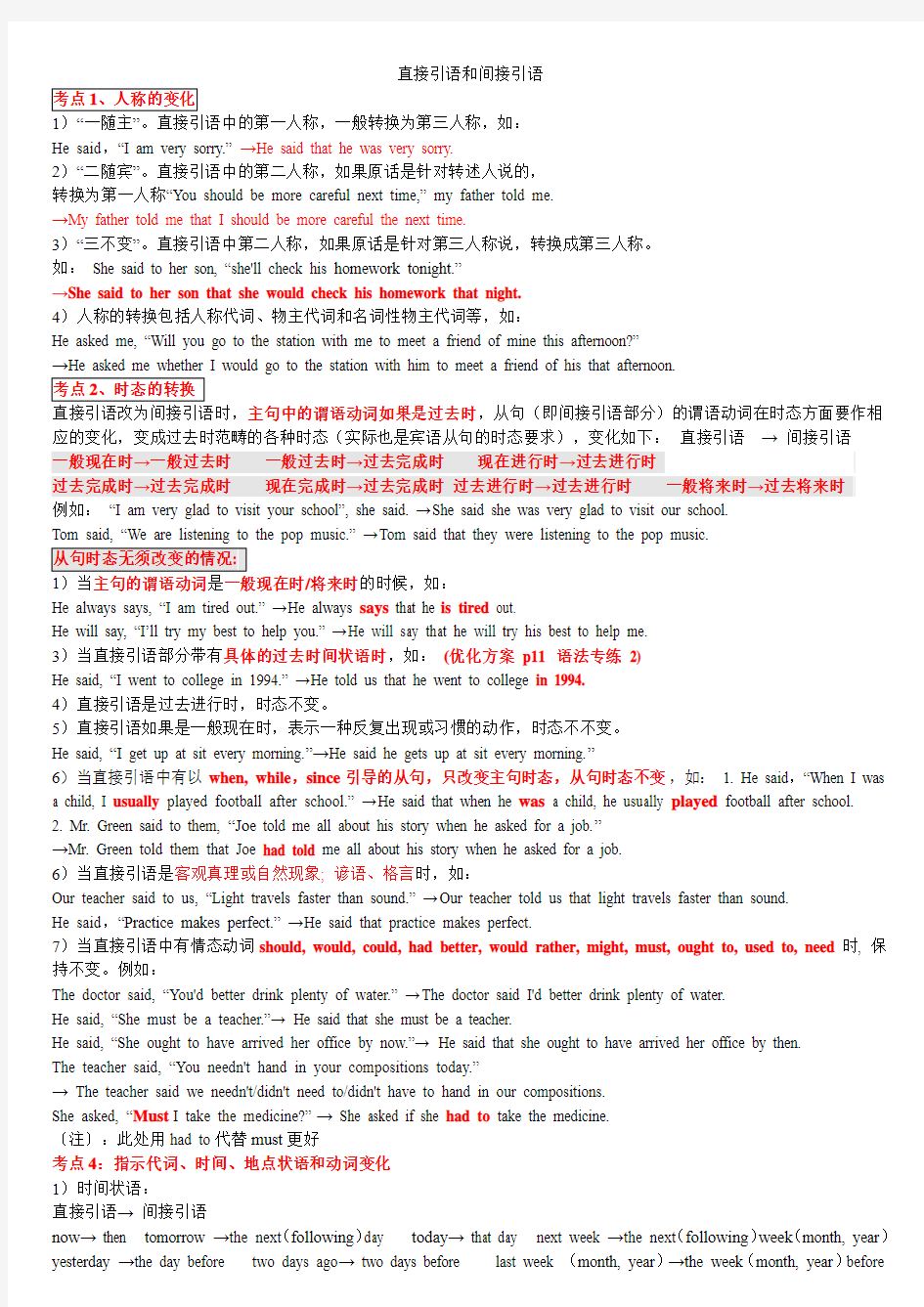直接引语和间接引语总结归纳

- 1、下载文档前请自行甄别文档内容的完整性,平台不提供额外的编辑、内容补充、找答案等附加服务。
- 2、"仅部分预览"的文档,不可在线预览部分如存在完整性等问题,可反馈申请退款(可完整预览的文档不适用该条件!)。
- 3、如文档侵犯您的权益,请联系客服反馈,我们会尽快为您处理(人工客服工作时间:9:00-18:30)。
直接引语和间接引语
1)“一随主”。直接引语中的第一人称,一般转换为第三人称,如:
He said,“I am very sorry.” →He said that he was very sorry.
2)“二随宾”。直接引语中的第二人称,如果原话是针对转述人说的,
转换为第一人称“You should be more careful next time,” my father told me.
→My father told me that I should be more careful the next time.
3)“三不变”。直接引语中第二人称,如果原话是针对第三人称说,转换成第三人称。
如:She said to her son, “she'll check his homework tonight.”
→She said to her son that she would check his homework that night.
4)人称的转换包括人称代词、物主代词和名词性物主代词等,如:
He asked me, “Will you go to the station with me to meet a friend of mine this afternoon?”
直接引语改为间接引语时,主句中的谓语动词如果是过去时,从句(即间接引语部分)的谓语动词在时态方面要作相应的变化,变成过去时范畴的各种时态(实际也是宾语从句的时态要求),变化如下:直接引语→间接引语
一般现在时→一般过去时一般过去时→过去完成时现在进行时→过去进行时
过去完成时→过去完成时现在完成时→过去完成时过去进行时→过去进行时一般将来时→过去将来时
例如:“I am very glad to visit your school”, she said. →She said she was very glad to visit our school.
Tom said that they were listening to the pop music.
1)当主句的谓语动词是一般现在时/将来时的时候,如:
He always says, “I am tired out.” →He always says that he is tired out.
He will say, “I’ll try my best to help you.” →He will say that he will try his best to help me.
3)当直接引语部分带有具体的过去时间状语时,如:(优化方案p11 语法专练2)
He said, “I went to college in 1994.” →He told us that he went to college in 1994.
4)直接引语是过去进行时,时态不变。
5)直接引语如果是一般现在时,表示一种反复出现或习惯的动作,时态不不变。
He said, “I get up at sit every morning.”→He said he gets up at sit every morning.”
6)当直接引语中有以when, while,since引导的从句,只改变主句时态,从句时态不变,如:1. He said,“When I was
a child, I usually played football after school.” →He said that when he was a child, he usually played football after school.
2. Mr. Green said to them, “Jo e told me all about his story when he asked for a job.”
→Mr. Green told them that Joe had told me all about his story when he asked for a job.
6)当直接引语是客观真理或自然现象; 谚语、格言时,如:
Our teacher said to us, “Light travels faster than sound.” →Our teacher told us that light travels faster than sound.
He said,“Practice makes perfect.” →He said that practice makes perfect.
7)当直接引语中有情态动词should, would, could, had better, would rather, might, must, ought to, used to, need时, 保持不变。例如:
The doctor said, “You'd better drink plenty of water.” →The doctor said I'd better drink plenty of water.
He said, “She must be a teacher.”→ He said that she must be a teacher.
He said, “She ought to have arrived her office by now.”→ He said that she ought to have arrived her office by then.
The teacher said, “You needn't hand in your compositions today.”
→ The teacher said we needn't/didn't need to/didn't have to hand in our compositions.
She asked, “Must I take the medicine?”→ She asked if she had to take the medicine.
〔注〕:此处用had to代替must更好
考点4:指示代词、时间、地点状语和动词变化
1)时间状语:
直接引语→间接引语
now→ then tomorrow →the next(following)day today→ that day next week →the next(following)week(month, year)yesterday →the day before two days ago→ two days before last week (month, year)→the week(month, year)before
